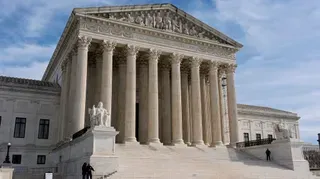May 14, 2010
Sucuzhañay case underscores LGBTs, immigrants remain particularly vulnerable to hate crimes
Michael K. Lavers READ TIME: 3 MIN.
As New Yorkers continue to react to the outcome of the trial of two men who prosecutors contend beat Jos� Sucuzha�ay to death on a Brooklyn street corner in Dec. 2008, activists contend this case highlights the painful reality immigrants and LGBT people remain particularly vulnerable to hate and bias-motivated crimes.
"People in our community feel like we can't justify responding to the hateful kind of speech or policies that target immigrants and not respond to the hateful kind of speech or policies that target lesbian, gay, bisexual and transgender people," said Ana Mar�a Archila, co-executive director of Make the Road New York. "Both kinds of hate and oppression are equally deadly and equally hurtful and damaging to human beings and families."
The Sucuzha�ay family has repeatedly argued this point. Speaking at Make the Road's Brooklyn offices on the first anniversary of his brother's murder, Diego Sucuzha�ay told Congresswoman Nydia Vel�zquez, City Councilmember Daniel Dromm [D-Jackson Heights] and others he feels immigrant and LGBT advocacy organizations have a responsibility to work together to end hate crimes.
"We maybe have different priorities, but we are two groups being targeted by hate right now," he told EDGE. "We are suffering the same. We are fighting for human rights. We need stop being treated as second class citizens."
Archila, who attended a press conference with New York City Council Speaker Christine Quinn and others outside the Brooklyn courthouse after a jury acquitted Hakim Scott of hate crime charges in connection with Jos� Sucuzha�ay's death, added the outcome of co-defendant Keith Phoenix's case only serves as a further call to action.
"There's a reality that it doesn't matter what happens in the trial; we can't recover the thing that was lost, which was the life of someone," she said. "What we can do is continue to insist that the justice system needs to deliver a verdict that recognizes hate crime is a motivation for hate violence and we as a society cannot tolerate it. We need to make sure our city is a place people feel safe."
A National Coalition of Anti-Violence Projects report released in 2008 indicates 52 percent of anti-LGBT hate crime victims who contacted affiliated agencies were people of color: 20 percent were of African descent, 23 percent identified themselves as Latinos, three percent were of Arab or Middle Eastern descent, two percent said they were Asian and one percent identified themselves as either Native American or Indigenous. Sharon Stapel, executive director of the New York City Anti-Violence Project, told EDGE the demographic of the victims with whom her agency works is no accident.
"We know that no one is assaulted for one part of their identity," she said. "We all have different and intersecting identities. It's all about the perception of who you are."
Jos� Sucuzha�ay is not the only person who has lost his life to anti-immigrant and anti-LGBT violence. Fijian immigrant Satender Singh died from a brain hemorrhage in July 2007 after a man punched him in the head near a lake outside Sacramento, Calif. Andrei Vusik and a group of his friends reportedly called Singh and his friends "7-Eleven workers" and "Sodomites" before the attack, but Stapel stressed perception can indeed prove fatal in these cases.
"The people who attacked the Sucuzha�ay brothers had no idea of who these folks were; they attacked them based on who they perceived them to be," she said as she further discussed the jury's inability to render a verdict against Phoenix. "Every single one of us-every single person on that jury-is vulnerable to that type of violence because we have no control on how someone perceives us."
Activists point to comprehensive immigration reform, equality for LGBT people, better reporting mechanisms and education about hate crimes in schools as solutions to this problem, but Archila conceded there is no easy answer.
"This case dominates a lot of people in these communities and highlights the need to do so much more than to win a verdict," she said.
Based in Washington, D.C., Michael K. Lavers has appeared in the New York Times, BBC, WNYC, Huffington Post, Village Voice, Advocate and other mainstream and LGBT media outlets. He is an unapologetic political junkie who thoroughly enjoys living inside the Beltway.







